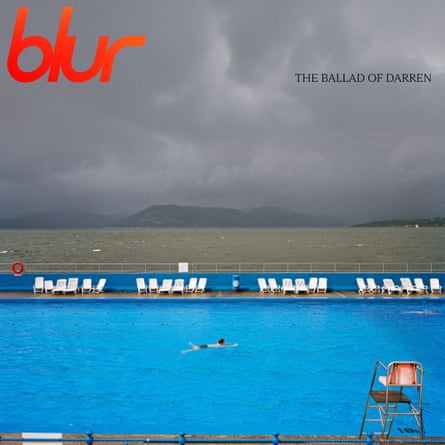‘We’re taking down the scaffolds very soon,” sings Damon Albarn, midway through Barbaric, presumably one of the songs he wrote for Blur’s ninth studio album while on tour with Gorillaz last year. Whether it was intended as such or not, the image of a venerable building being revealed to the public once more seems like an anticipatory nod towards Blur’s second reunion, 33 years on from their debut single.
It has, thus far, been a remarkable success. There have been stadium gigs and festival headlining slots, at which the old hits were rolled out to giddily euphoric response, and the touching sight of Albarn being reduced to tears on stage by the reception afforded them at Wembley.
If a venerable band that deigns to reform bothers to make a new album, said album tends to follow a set pattern: a fair forgery of past musical glories, designed to provoke a glow of nostalgia among listeners. The Ballad of Darren certainly ticks a few boxes on the Blur bingo card: noisy Girls and Boys-ish guitar; asides in the most estuary-accented of Albarn’s many voices (there is even a rogue “Oi!”); warm swells of brass that recall the arrangement of For Tomorrow; Graham Coxon’s blank-eyed, vaguely childlike, Syd Barrett-haunted backing vocals. It lacks the fidgety, prickly quality that marked out 2015’s The Magic Whip – an album carved out of jam sessions hastily convened during downtime on a previous reunion tour – majoring instead in the crestfallen, rumpled-sounding ballad that has become Albarn’s signature style, filled with melancholy descending chords.
You could call the songs here nostalgic, but there is no rosy glow about their reflections on the past. Instead, they opt for something more realistic, suggesting that nostalgia is the kind of thing that can keep a fortysomething or fiftysomething awake at night, worrying. Albarn’s lyrics are filled with regrets, ruminations on sundered friendships (“Are you online? Are you contactable again?”), recollections that induce winces rather than warm smiles. They occasionally offer hard-won wisdom – “You can’t play to every taste, the powder keg of common cause” – but also wonder aloud if it is possible to apply said wisdom to your own life, rather than just dole it out. “We are not going to shy away, we are growing tall with the pain,” Albarn sings boldly on The Everglades (For Leonard), undercutting it with the song’s deflated final line: “Furthermore, I think it is just too late.”
Some of what he has to say is clearly about Blur’s history. But the occasional sweet memory – “We travelled around the world together,” Albarn and Coxon sing on the opener, The Ballad – is vastly outweighed by darker thoughts. The lead single, The Narcissist, is effectively a four-minute apology for the swaggering confidence and vaulting ambition that fuelled Blur’s rise from baggy also-rans to Britpop ubiquity, a theme picked up on by St Charles Square: “I fucked up … every generation has its gilded poseurs.”
It offers a remarkably unsparing portrait of Albarn at the moment when that populist ambition curdled, when the public started making it abundantly clear that, in the so-called Battle of Britpop, they were backing Oasis: trapped in a “basement flat with window bars”, assailed by self-doubt and “something” – presumably heroin – “living under the floorboards” that has “grabbed me by the ankle and pulled me under”.
But most of The Ballad of Darren feels less specific, its thoughts on ageing and memory pointed, but general enough that anyone of a similar vintage to Blur can see their own reflection. Releasing an album that depicts middle age as a minefield of remorse, broken relationships and existential dread (“I have lost the feeling that I never thought I’d lose / Now where am I going?”) feels like an impressively ballsy, confrontational move for a band with a middle-aged fanbase – the diametric opposite of provoking a carefree singalong to Parklife at Wembley – although the music sugars the pill.
The tunes are uniformly gorgeous. No one expects career-best stuff from a reformation album, but the sighing melody of The Ballad is among the loveliest in Blur’s catalogue. The sound of Coxon’s guitar weaving wiry little threads around the chugging synth and vocodered vocals of Goodbye Albert, or shimmering over the waltz-time Far Away Island, is a delight.
Moreover, it is an album that suggests Blur still have something germane to say, that they are not content to rest on their back catalogue, which makes the question of their future more intriguing. The Ballad of Darren doesn’t offer an answer. Laced with plangent strings, the closing track, The Heights, initially sounds as if it is going to be a grand finale, but the expected climax never comes. Instead, the song is unexpectedly overwhelmed by the racket of Coxon’s guitar, until you are just listening to white noise, which suddenly cuts dead. It feels like a cliffhanger ending, leaving you wondering what might happen next.
This week Alexis listened to
Jessy Lanza – Limbo
A perfectly timed return from Canada’s leading purveyor of postmodern pop-R&B, Limbo is joyously melodic and suffused with seasonal sunshine.

